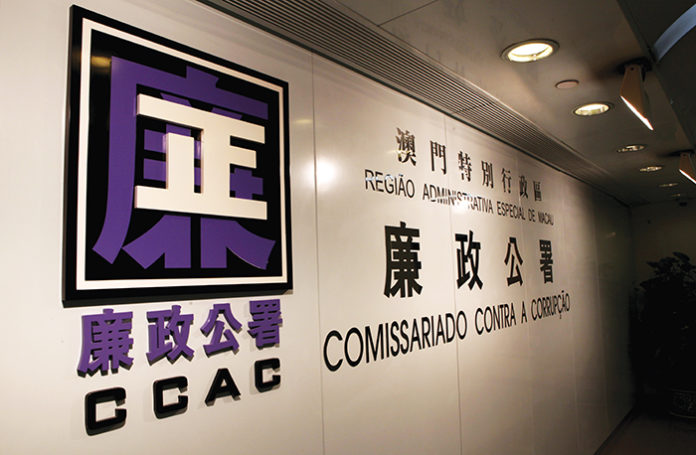“We’re the most powerless department,” said Vasco Fong Man Chong, then chief of the Commission Against Corruption of Macau, in 2013. “We can only make recommendations to other [government] departments; whether they act in accordance with the suggestions, they only need to report to their bosses.”
His discouraging remarks were made in the wake of legislators expressing dissatisfaction with government departments ignoring calls made by the city’s two watchdogs – the anti-corruption body and the Commission of Audit.
Some four years have since passed, with the two Commissions releasing more than 20 reports, but most suggestions have seemingly fallen on deaf ears once more – reducing the two bodies to little more than “paper tigers”. Does this mean they should have more powers? Political observers believe the buck stops on the desk of the city’s top job.
A recent case highlighted by the corruption watchdog, which also functions as Ombudsman here, reveals in its annual report for 2016 how little officials heed its recommendations. In 2015, the Commission discovered that the Macao Government Tourism Office (MGTO) had re-employed a retired worker from its Office in 2013 as a technician, who did not meet the educational requirements the position required. The tourism body was consequently advised by the Commission to address the issue, and responded by declaring it had terminated the contract with the worker.
It later came to the watchdog’s notice, however, that MGTO had established another type of contract with the worker at a monthly salary of MOP65,000 (US$8,125), with the person later appointed as an advisor to the tourism body. The worker did not have any ‘special talents’ for being an advisor, while his job responsibilities as an advisor were similar to his previous position, the report revealed.
‘This shows that the Macao Government Tourism Office still tried other means to bypass the established recruitment procedures . . . for hiring that worker with the same or better salary package in spite of the warning issued by the Commission,’ the report lamented. The tourism body finally employed the worker on an administrative appointment contract at a lower salary in October 2016 following another warning by the watchdog. MGTO Director Maria Helena de Senna Fernandes later explained that they had a different understanding of educational requirements with the watchdog, but said she respected the Commission’s observations.
Separation of powers
“According to the city’s laws, the capacities of the two bodies are only limited to reviewing and looking for any shortcomings in the practices of government departments, and making any relevant recommendations,” says local political commentator Larry So Man Yum. “They are somehow like the local legislature: whatever suggestions they make, the decision-making power still lies in the hands of the executive branch.”
Nevertheless, he does not think the two watchdogs should have more powers, making their recommendations legally binding. “That sounds nice on the surface but I’d prefer not to; these will make the two bodies have too much power and create confusion in the executive branch,” he said. “The separation of powers in the government is now very clear: the two watchdogs look at any irregularities in practice, while the Chief Executive and five Secretaries oversee how the departments follow up on the reports of the watchdogs.”
The annual Policy Address should have a section every year dedicated to how the public bodies comply with and execute the recommendations of the watchdogs to boost their administrative efficiency, he remarked, adding, “This could also enhance the transparency [of the government] for public supervision.”
Two major tools
Not only does the anti-corruption body voice sharp criticism of the public bodies; so does the Audit Commission, which has published more than a dozen hard-hitting reports in the past few years and scrutinised the accounting procedures and financial arrangements of the public bodies.
The public auditors have compiled three reports since 2011 on the financial situation of the long-delayed Light Rapid Transit (LRT) railway project. One of the main censures in the three reports – and also for many public infrastructure projects the Commission has audited -was that the authorities had failed to supervise and control the budget, leading to budget ‘overruns’. The Administration has still yet to provide a full budget forecast for the LRT project, put at MOP4.2 billion in 2007. It has only confirmed that the cost of the Taipa section – slated to be operational in 2019 – would not exceed MOP11 billion.
“The reports released by the two watchdogs can retain public attention for a while,” said Au Kam San. “Afterwards, the usual scenario is the Secretary overseeing the criticised department will demand a report on how to follow up on the recommendations. A few months later the public will forget about it . . . and the problems are then left unaddressed.”
Describing the two Commissions as “paper tigers” now, the legislator believes that the Chief Executive could better employ the two watchdogs, which directly report to him or her in accordance with the Basic Law, the city’s mini-constitution. “The two independent Commissions serve as important tools to help the Chief Executive oversee the integrity and the usage of financial resources of officials and government departments,” he says.
But the city’s two Chief Executives of the past 17 years – Edmund Ho Hau Wah and Fernando Chui Sai On – have “not fully utilised” these two tools, he added.
Abuse of power
Nonetheless, there are occasions when the authorities promptly respond to the recommendations of the watchdogs. Following a hard-hitting report by the anti-corruption body in 2013 regarding the bus contract format the authorities had inked with the bus operators, the Transport Bureau gradually signed new contracts with the three operators, with the last two signed last year.
The Commission also slammed the Administration for its management of the LRT railway in 2012, and proposed a change of route of the railway in NAPE, advice that was adopted by the Administration. But this recommendation raised some eyebrows in the city, casting aspersions on the watchdog at the time for overstepping the powers of the government department in charge of the project.
Legislator José Pereira Coutinho also believes the two watchdogs have enough powers to carry out their work but also said Mr. Chui could do more to address the mishaps underscored by the reports. “The Chief Executive could set up an independent committee to follow up on some issues pointed out by the watchdogs as allowed in the city’s laws, but the [two] Chief Executives have never done so in the past 17 years,” he said. “This practice was not uncommon for the former Portuguese Administration before the handover [in 1999].”
Responding to the queries of legislators in a regular session in April, Mr. Chui only said the Administration would continue to study and follow up on the reports published by the two Commissions in order to improve the governance of the territory. “[We will] actively improve our supervision mechanism, as well as fully unleashing the supervision capacities of the Commission Against Corruption and the Commission of Audit,” he said, reiterating remarks similar to comments made in the past.
No accountability
When the Commission Against Corruption and the Commission of Audit release condemnatory reports on the irregular practices of government departments the public bodies usually respond that they respect the recommendations and will follow up on the matter. But what’s missing here?
The officials in charge that take the blame.
Albeit repeating pledges by the two Secretaries for Administration and Justice over the years to establish an accountability system for officials, the public – in one case after another – see officials fail to accept their responsibilities.
“Whenever some irregularities have been reported in the practices of a public body, it will only respond that it will review its procedures but you rarely see an official take the fall for it,” said legislator Kwan Tsui Hang. “It always makes the public wonder whether accountability exists for the officials here.”
Since the handover in 1999 there has been talk of setting up an accountability mechanism for officials. Then Secretary for Administration and Justice Florinda da Rosa Silva Chan only addressed the topic in 2006: they were drafting a guideline for principal officials and the Chief Executive – including Secretaries – as well as guidelines for officials as heads of department, such as directors of bureaus and chiefs of division and department in a bureau, which would require officials to step down in the event of any major faults.
The guidelines for officials as heads of department became effective in 2009, while other guidelines were enforced in 2010. Ms. Chan said at the time that the implementation of the guidelines were a few steps closer to Macau having “a complete accountability system for officials.”
“There have been guidelines, but no officials have taken any responsibility when they are to blame,” legislator José Pereira Coutinho lamented. The anti-corruption body recently accused the Cultural Affairs Bureau of bypassing the standard recruitment procedures for years, but Guilherme Ung Vai Meng retired from his position as president of the Bureau weeks before the release of the report.
Assuming the position of Administration and Justice Secretary in December 2014, Sonia Chan Hoi Fan also pledged the government would “gradually improve the accountability system” by introducing an objective and scientific mechanism to assess the performance of officials. “There is a legal basis for the accountability system for officials . . . and we will introduce a third-party assessment to polish this system,” she said in early 2015, adding the third-party assessment would be introduced by the end of the same year.
The city’s five-year development plan for 2016-2020 also emphasises that the authorities will strengthen the accountability system with better assessment criteria. ‘Any officials failing the assessment . . . must take up responsibility,’ the document intoned.
However, this third-party assessment has yet to materialise. Secretary Chan explained the delay last November by saying that the government had commissioned an academic institution to study how this assessment, which would collect public opinion, could be conducted. The report on the matter would be published by mid-2017 and a public consultation exercise would take place by end-2017, she pledged.
Political commentator Larry So Man Yum is not surprised at the delays. “It involves vested interests with regard to the accountability system for officials,” he said. “That’s how the government handles issues it doesn’t want to tackle: it stalls the progress.”
“Then they can say they will leave it for the next term of government to handle due to limited time – and this cycle goes on,” he concluded. As time flies, Secretary Chan has less than half of her five-year tenure to keep her word.
























